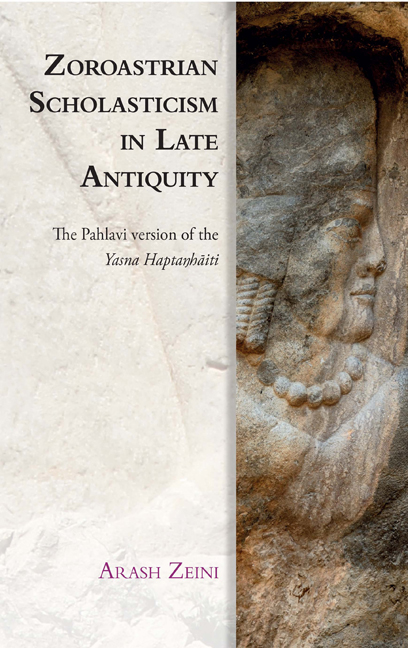Book contents
- Frontmatter
- Contents
- List of Figures
- List of Tables
- Acknowledgements
- Series Editor’s Preface
- Preface
- Conventions
- Abbreviations
- Dedication
- Part I Introduction
- 1 Introduction
- 2 The Zand
- 3 Scholasticism
- 4 Fire in Zoroastrianism
- 5 Precis: Yasn Ī Haft Hād
- Part II Text and translation
- 6 PY 35
- 7 PY 36
- 8 PY 37
- 9 PY 38
- 10 PY 39
- 11 PY 40
- 12 PY 41
- Part III Miscellaneous Observations
- 13 PY
- 14 PY 36
- 15 PY 37
- 16 PY 38
- 17 PY 39
- 18 PY 40
- 19 PY 41
- Part IV Epilogue
- 20 Reflections on the Zand
- Appendices
- Appendix A Transliteration and Apparatus
- Appendix B Y 9.1
- Appendix C Fire in the Older Avesta
- Appendix D Iϑā
- Appendix E MSS Concordance
- Bibliography
- Index of Passages Quoted
3 - Scholasticism
Published online by Cambridge University Press: 14 October 2020
- Frontmatter
- Contents
- List of Figures
- List of Tables
- Acknowledgements
- Series Editor’s Preface
- Preface
- Conventions
- Abbreviations
- Dedication
- Part I Introduction
- 1 Introduction
- 2 The Zand
- 3 Scholasticism
- 4 Fire in Zoroastrianism
- 5 Precis: Yasn Ī Haft Hād
- Part II Text and translation
- 6 PY 35
- 7 PY 36
- 8 PY 37
- 9 PY 38
- 10 PY 39
- 11 PY 40
- 12 PY 41
- Part III Miscellaneous Observations
- 13 PY
- 14 PY 36
- 15 PY 37
- 16 PY 38
- 17 PY 39
- 18 PY 40
- 19 PY 41
- Part IV Epilogue
- 20 Reflections on the Zand
- Appendices
- Appendix A Transliteration and Apparatus
- Appendix B Y 9.1
- Appendix C Fire in the Older Avesta
- Appendix D Iϑā
- Appendix E MSS Concordance
- Bibliography
- Index of Passages Quoted
Summary
When nothing could be composed any more in the ancient language, of which even the learned priests had only an imperfect understanding, the Avesta could still undergo change and adaptation by using the instrument of Zand.
Shaked (2003: 73)Any expression of thought, be it religious or otherwise, inadvertently pro- vokes the act of interpretation or exegesis. Religious traditions in particular interpret their sacred literature so as to sustain the contemporary relevance of their scriptures. Such commentaries are often produced by generations of exegetes, resulting in stratified texts. Different religious traditions have dealt differently with the transmission of the source texts and their exegesis, partly under the influence of external factors or technological innovations. Printing, for instance, substantially changed the face of the talmudic manuscript page. While the manuscripts only carried the text of the Talmud, already the earliest printed Talmud, dated 1483, included two different commentaries in the margins (Fram 2005: 91). In subsequent decades the page of the Talmud became more complex and accommodated different strata of commentaries and references.
Zoroastrian priests sought to make Avestan texts comprehensible to their contemporaries by adding Middle Persian translations and sporadic comments to the source texts. That the Zand was considered comprehensible and more widely understood emerges from the accounts of the Avesta's transmission in Dēnkard and from a passage in ZWY (see Section 3.7). Although the Zand could have been initially transmitted orally, it has come down to us in bilingual manuscripts of Avetsan texts, where they are at times accompanied by interlinear translations or commentaries in the margins of the manuscripts in a third language such as Persian.
Western scholars acknowledged the Zand's worked up and stratified nature early on, which may have contributed to its recognition as exegetical literature:
[W]e should especially claim for the renderings that they are a mass of overworked material, which, of course, rather heightens than lowers their value to the close expert, for the more numerous are the strata of consecutive treatments, the keener becomes our hope of the gems of antiquity. (Mills 1900: 290)
Exegesis, however, is not limited to canonical religious literature and covers a wider spectrum of phenomena.
- Type
- Chapter
- Information
- Zoroastrian Scholasticism in Late AntiquityThe Pahlavi Version of the Yasna Haptaŋhāiti, pp. 40 - 62Publisher: Edinburgh University PressPrint publication year: 2020



